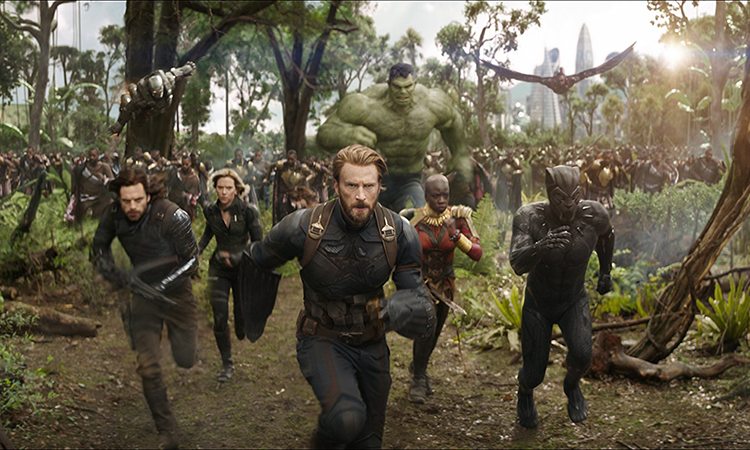Ten years ago, the post-credits scene of 2008’s humble “Iron Man” promised that a team would assemble. That eventually happened in “The Avengers”, but its mid-credits scene revealed that Thanos had much more in store. Across eighteen movies, the Marvel Cinematic Universe got bigger, braver, and weirder, expanding to space and embracing its operatic comic book roots. Finally, “Avengers: Infinity War” is here to follow through on a decade of preparation.
It aims to culminate 38 hours of cinematic storytelling, character arcs and world-building into a single spectacle. It’s never been done before, but directors Anthony and Joe Russo are fitting filmmakers for the job: they helmed the last two “Captain America” movies, and their ensemble comedy work on “Community” and “Arrested Development” proves that they can juggle people and plots. But can they handle this many balls in the air?

“Infinity War” wastes no time in laying down its mission statement. Thanos, imposing and villainously lit, represents a level of death and destruction that defies the franchise’s gleeful disposition. Marvel has diluted their movies’ stakes with quasi-comedy in the past, but Thanos’ powerful introduction makes it clear that anything could happen—and to anyone.
Despite boasting the vibrant color palette of its predecessors, the tone of “Infinity War” is decidedly darker. Thanos seeks to destroy half of the sentient life in the universe. “Infinity War” wears this gloom and doom with aplomb—which makes some humor unwelcome. One-liners feel at home, but extended sequences played only for laughs are unfitting. The Guardians of the Galaxy deserve most of this blame, unsurprisingly.
Thanos, progenitor of the movie’s high stakes, is practically the protagonist. Josh Brolin imbues the purple CGI monstrosity with a surprising amount of pathos, but the screenplay outmatches his success in that regard. The strongest villains are the ones who have a point, and while one might think that there’s no good reason to murder half the universe, “Infinity War” finds a few. Thanos’ arc raises questions of ends justifying means, even if those means are unimaginably cruel. This ethical quandary plants its tendrils in the plans of the heroes too—this is Marvel at their most thematically courageous.
Unfortunately, the movie’s best ideas are thrown into disarray by haphazard pacing. “Infinity War” is crowded by design, but it could’ve used another year in the edit room. The action rises and falls in awkward fits and starts, escalating only to be cut short by yet another subplot. The third act skillfully cross-cuts between points of rising action to build excitement, but the rest of the movie falls short: “Infinity War” interrupts itself so often that it’s hard to keep caring. The second act is infinitely cluttered.
The plus side to having a hundred separate buildups, though, is having a hundred separate payoffs. The film is full of triumphant moments, ensuring big grins and loud cheers all around. But these moments are dreadfully imbalanced. Captain America, so prominent a figure in the past, barely registers as a character. Black Panther only has five or so lines.
On such uneven ground, “Infinity War” fails to stand on its own. It takes some characters for granted because they were well-developed in other movies; some conflicts don’t resonate at all because the franchise hadn’t touched on them in years. It’s as if a full Marvel movie marathon is necessary to fully enjoy the experience.
These flaws are perhaps the hazards of long-form cinematic storytelling. The movie’s weakest elements—the attempt to resolve a decade of stories and an overreliance on former movies—stem from what came before. Its strongest elements—ethical dilemmas and a breathtakingly audacious ending—are cheapened by what’s to come. The finale makes astonishingly bold decisions, but a quick glance at Marvel’s eternal production schedule reveals that many of them won’t last long, robbing them of their emotional impact and ethical resolve.
“Infinity War” is good, but it’s crippled by its position in the bigger picture. We should take a closer look at Marvel’s grand experiment. Would other filmmakers better handle the challenges presented by it? Is this long-form cinematic universe sustainable? Should we keep throwing our money at it? Are you not entertained?
★★★½ (3.5/5)




